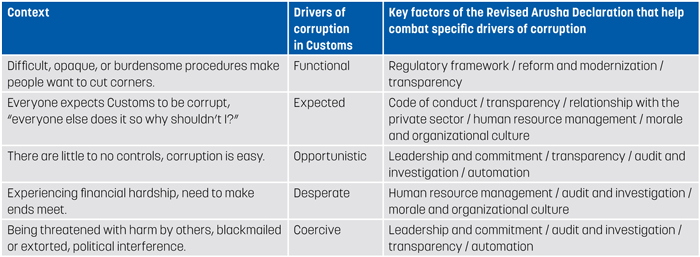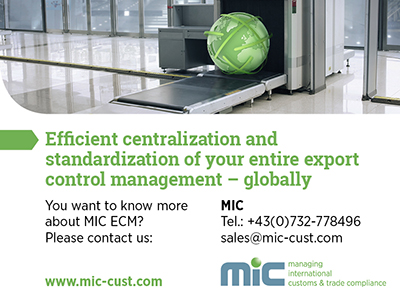WCO Revised Arusha Declaration: putting integrity back in the spotlight
25 February 2020
By the Capacity Building Directorate, WCO SecretariatSince the late 1980s, WCO Members have been drawing and sharing lessons from their experiences in combating corruption and promoting integrity. They identified various factors that effective national Customs integrity programmes must address, and consolidated them into 12 and later 10 factors[1] in the Arusha Declaration Concerning Good Governance and Integrity in Customs, which was adopted in 1993 and revised in 2003.
This article highlights the relevance of the principles embedded in the Revised Arusha Declaration and how they enable Customs administrations to address the different drivers of corruption whilst ensuring compliance with other international integrity-related obligations. The main objective of this article is to put the issues of integrity and corruption back in the spotlight as well as remind readers of the need to anchor the fight against corruption in a policy of reform and to keep it a priority.
Different drivers of corruption
If the word “factor” is used in the Revised Arusha Declaration, it is done so generically, referring to work areas, principles and practices that must be addressed or used to reduce or eliminate opportunities for corruption. Acknowledging that corruption is a human behaviour that is shaped by context, the Declaration lists specific areas where Customs must take action to change the context within which Customs officers operate.
While delivering activities under the WCO Anti-Corruption and Integrity Promotion (A-CIP) Programme, funded by the Norwegian Agency for Development Cooperation (Norad), experts confirmed how relevant the Arusha principles were for Customs administrations in the fight against the different drivers of corruption, in other words the causes, opportunities and incentives for corruption. They identified five drivers, which they called “functional,” “expected,” “opportunistic,” “desperate,” and “coercive.” These drivers are explained in more detail below, with examples drawn from experience on the ground in A-CIP partner administrations.
Functional drivers occur when difficult, opaque or burdensome procedures create incentives for people to cut corners. The Revised Arusha Declaration addresses these issues under the “Regulatory Framework” factor, requiring administrations to harmonize and simplify Customs laws and regulations by implementing internationally agreed conventions, other instruments and standards, as well as under the “Transparency” and “Modernization and Reform” factors, which deal with information availability, including the use of modern systems and procedures that specifically target process efficiency and effectiveness. Thus, the Declaration not only makes the fight against corruption a priority for Customs, it also establishes a concrete link between reforms and anti-corruption policies. Corruption in Afghanistan Customs, for example, has been clearly linked to the need for reforms; as such, the administration is currently working to modernize procedures and regulations in line with the provisions of the WCO Revised Kyoto Convention and the WTO Trade Facilitation Agreement.
Expected drivers relate to the social pressure that can foster corrupt behaviour. This behaviour can be derived from a sense that everyone expects Customs to be corrupt, or that Customs officers are not taking advantage of their position properly if they are not reaping off-the-book benefits. The Revised Arusha Declaration addresses these issues under the “Code of Conduct,” “Relationship with the Private Sector,” “Transparency,” “Human Resource Management,” and “Morale and Organizational Culture” factors. Corruption in Nepal Customs, for example, has been linked to these drivers; in response, the administration is working to improve its relationship with the private sector, the availability of its procedures, and communication with the public.
Opportunistic drivers are found when internal controls are weak or non-existent. Temptations to corruption simply happen because it is easy to do so. The Revised Arusha Declaration addresses these issues under the “Audit and Investigation,” “Automation,” “Leadership and Commitment” and “Transparency” factors. Corruption in Sierra Leone has been linked to these drivers; as such, the National Revenue Authority is setting up a new Internal Affairs Unit to strengthen internal oversight and control.
Desperate drivers are observed when personal circumstances, such as experiencing financial hardship or low morale force officers to supplement their income by other means. The Revised Arusha Declaration addresses these issues under the “Audit and Investigation,” “Human Resource Management,” and “Morale and Organizational Culture” factors. In Ethiopia, following a recent organizational restructuring process, the Customs administration is working to ensure that recent changes are understood by staff and do not affect their morale.
Coercive drivers happen when officers are forced by threat to engage in corrupt activities. Threats can either be direct (i.e. through violence or blackmail) or indirect (i.e. through political interference or pressure from managers). The Revised Arusha Declaration addresses these issues under the “Leadership and Commitment,” “Audit and Investigation,” “Transparency,” and “Automation” factors. In Liberia, the Revenue Authority is addressing political interference, resulting in exemptions and concessions being granted without justification, by strengthening management capacities through automation and transparency.

Meeting international anti-corruption obligations
Besides addressing today’s drivers of corruption in Customs, the WCO Revised Arusha Declaration also helps countries to comply with their obligations under anti-corruption conventions and to meet UN Sustainable Development Goal (SDG) 16, which is related to “Peace, justice and strong institutions.” SDG 16 includes commitments to fight corruption, increase transparency, tackle illicit financial flows, and improve access to information. As such, the goal is critical to the entire 2030 Agenda, because corruption undermines progress on all the other SDGs.
Among these international instruments is the 2005 UN Convention Against Corruption (UNCAC). Chapter II of UNCAC lists practical measures to prevent corruption, which are aligned with and encompass some of the Revised Arusha Declaration provisions. These measures include the development, introduction and implementation of conflict of interest regulations, measures to increase transparency of Customs services and strengthening whistle-blower protection, as well as developing and introducing a strong control environment with proper oversight and accountability. To date, 135 WCO Members have ratified UNCAC, and thus are legally bound by it, and another 38 have made various degrees of commitments to this important instrument.
A transversal issue
Integrity is a transversal issue and the WCO Secretariat has been ensuring that discussions around corruption do not stay limited to the Capacity Building Committee or the Integrity Sub-Committee. As a result, the WCO Information Management Sub-Committee regularly includes the topic on its meeting agendas with the aim of exploring the links between ICT and integrity matters.
Additionally, the WCO Secretariat marked International Anti-Corruption Day on 9 December 2019 by organizing an event for its staff aimed at building a common understanding of the various drivers and aspects of corruption, including the impact of corruption on Customs’ work as well as ways in which integrity and anti-corruption issues could be integrated into the Secretariat’s work streams and programmes.
Strategic priority
WCO Members have asked the Secretariat to include integrity among the Organization’s strategic priority areas for 2019-2022. Many tools are available for Customs administrations wishing to review their existing practices, such as the Integrity Development Guide and the Guide to Corruption Risk Mapping.
Moreover, the WCO Secretariat remains at the disposal of any Customs administration requesting assistance in this area. Various types of activities are proposed, such as integrity assessment missions, missions to provide guidance on the introduction of performance measurement systems, and ad hoc missions to provide support in revising a code of conduct, an integrity strategy, a training plan or the mapping of corruption risks.
More information
Integrity@wcoomd.org
http://www.wcoomd.org/en/topics/integrity.aspx
http://www.wcoomd.org/en/topics/capacity-building/activities-and-programmes/cooperation-programmes/acip-programme.aspx
[1] The 10 factors are: Leadership and Commitment, Regulatory Framework (harmonization and standardization), Transparency, Automation, Reform and Modernization (process efficiency and effectiveness), Audit and Investigation (internal controls), Code of Conduct, Human Resource Management, Morale and Organizational Culture, and Relationship with the Private Sector.

